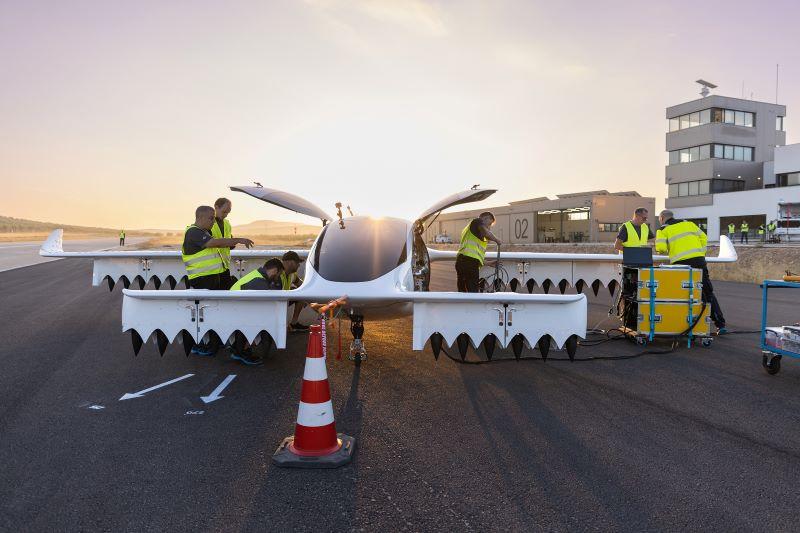
This year is shaping up to be a pivotal one for the burgeoning advanced air mobility (AAM) sector, and whether the companies in the race to certify their aircraft have the necessary capital remains an open question.
Financial conditions have tightened considerably over the last 12 months, and interest rates continue to rise around the world, helping to send AAM stocks to new depths each week, with some companies now officially in penny-stock territory.
One of those companies is Lilium, the German startup seeking to certify its ducted-fan, vectored-thrust Lilium Jet air taxi by 2025. The company’s stock price has plummeted in recent months amid swirling concerns about its high rate of cash burn and narrowing liquidity runway.
Lilium ended 2022 with around $273 million in cash after raising an additional $119 million from investors, but the company is forecast to spend between $250 million and $280 million in 2023, according to projections from SMG Consulting. That means it urgently needs to raise money this year to fund operations into 2024.
Raising capital will be no easy feat in the current financial markets, however. Debt servicing costs have risen tremendously in the last year, and stock valuations have been pummeled across the sector–Lilium’s shares have fallen by roughly 80% over the last 12 months–meaning any new share issues will generate less cash while further diluting the share price for existing investors.
Lilium CEO Klaus Roewe recently acknowledged in an interview with Aviation Week that it is “obvious” his company does not have enough cash to make it to type certification, expected for 2025. But he said he was “100% confident” that Lilium will find a way to close the funding gap, even if that means looking to potential strategic investors or even government funding as options to shore up the company’s balance sheet.
Roewe added that Lilium was in “advanced discussions” with its existing investors and shareholders toward securing more funding, which he said would finally “resolve this mess once and for all,” although he declined to offer more details.
Lilium’s latest filing to the U.S. Securities and Exchange Commission (SEC) indicated a need to raise $300 million to get to first manned flight of the Lilium Jet, at which point it would unlock up to $250 million in predelivery deposits that it plans to generate from sales of its private aviation-focused Lilium Jet Pioneer Edition. All told, the company has said it needs $540 million to see the program through to type certification, expected in 2025.
There are questions among industry watchers about how Lilium plans to use those funds, however. Typically, predelivery deposits (PDP) are placed into an escrow account that can be fully refunded to the customer if the aircraft fails to be built or delivered for whatever reason–a risk that is much higher for startups like Lilium that are essentially unproven and yet to certify a product. But Lilium’s PDPs may be structured in a way that allows it to use them for general operational and certification costs.
Another factor that adds urgency to Lilium’s financial dilemma is its steadily declining stock price, which first fell below $1 on March 1 and has traded as low as 65 cents in recent weeks. The company acknowledges in a recent SEC filing that its sub-dollar share price could jeopardize its membership in the NASDAQ, which typically sends warning notices after 30 days of trading below that threshold, with a further 180 days of advance notice usually provided before delisting.
Still, even without an emergency infusion of cash, there are ways to avert that scenario from occurring. One maneuver would be a reverse stock split, which would prop up the price by reducing the circulating supply. But such maneuvers are generally interpreted by investors as a sign of bad news, meaning it would only be advisable if there are no better alternatives available.
“It’s generally not a piece of good news to see a company reverse split, which is probably why they haven’t done it yet,” says Sergio Cecutta, founder and president of SMG Consulting. “If you look at today’s investment climate, it’s not easy to raise money now, and you have to consider what valuation you raise money at, too.”
To be sure, Lilium is not the only AAM startup in a precarious cash position. Vertical Aerospace ended 2022 with £122.8 million ($151 million) in cash and expects to spend £90 million over the next 12 months, leaving it with a cash runway through the first quarter of 2024, according to Raymond James analyst Savnathi Syth.
But Vertical does have access to $87 million in net funds remaining in a three-year subscription line it arranged with Nomura Securities International last year, and it is burning cash at a much slower pace than Lilium, with roughly $110 million projected cash burn in 2023, according to SMG Consulting. Still, its shares have fallen 80% in the last six months, and it will still have to raise more money to get to certification.
Other AAM companies may soon find themselves in a similar predicament. Cecutta highlights Autoflight, Eve Air Mobility and Eviation as OEMs that could run into liquidity problems if they continue to burn cash at current rates. But the situation facing Lilium and Vertical is particularly serious, he warns, because both those companies are aiming for certification and service entry in 2025, which makes the need to raise cash this year more dire.
“I think the proximity to certification of these companies makes raising cash more urgent,” Cecutta says. “Whatever way you slice it, Lilium and Vertical don’t have enough cash to get to certification, and that won’t be an easy task in this market. So, we know they need to raise money. We just don’t know how they do it yet.”
